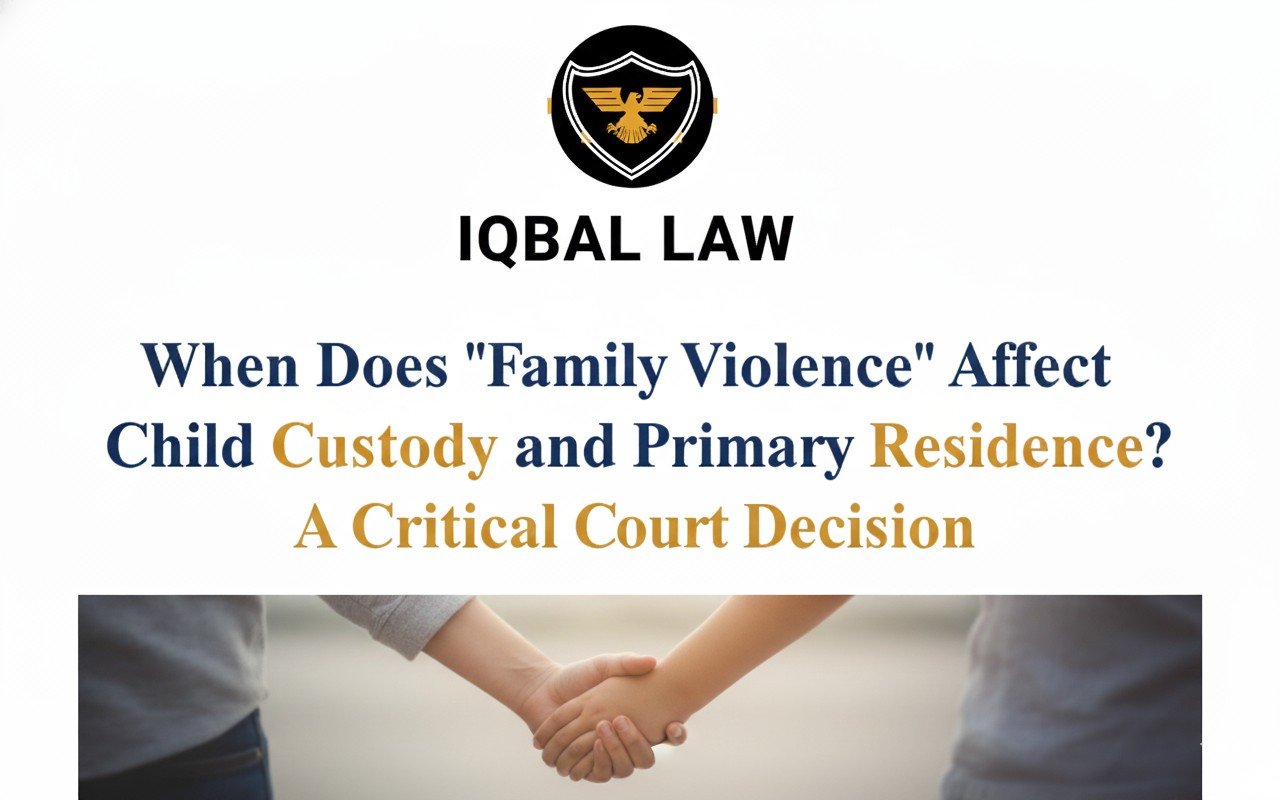
In family law, few issues are as high-stakes as determining a child’s primary residence and parenting time schedule. When allegations of family violence are introduced—even if they don’t involve physical assault on the child—the court’s focus shifts entirely to the child’s best interests and safety.
A recent Ontario court decision illustrates how a parent’s actions, even seemingly benign ones like exposing a child to conflict and failing to maintain a routine, can be legally deemed a form of “family violence” that directly impacts where a child lives.
The Breakdown: Competing Claims and a Child’s Well-being
This particular case involved the parents of a 9-year-old child, “A.”, who separated after the mother was charged with assault. Following the separation, the child had been living primarily with the father. However, the mother sought to change this, asking the court for A.’s primary residence to be with her, arguing the father’s care was unstable.
The mother’s concerns were serious:
- The father was allegedly exposing A. to high conflict.
- A. had a concerning number of school absences.
- The father was failing to provide a stable routine for the child.
The father denied these allegations, arguing that the status quo should remain and that the child should stay in his care.
The Court’s Scrutiny: More Than Just Physical Harm
Justice Kraft, in reviewing the evidence, made a key determination: the father’s conduct amounted to family violence under the Divorce Act.
How did the court arrive at this finding?
The court found that the father’s behaviour—denigrating the mother to A. and involving the child in adult disputes—was emotionally harmful. This exposure to high parental conflict was considered a form of psychological abuse or emotional family violence.
Beyond the conflict, the judge found the father was simply unable to meet A.’s basic needs for stability. A routine is crucial for a 9-year-old, and evidence of frequent school absences and late bedtimes became strong indicators of an unstable and unsupported environment.
The Final Order: Primary Residence Shifts
Based on the evidence, the court ruled that A.’s best interests required a significant change.
- Primary Residence: Was granted to the mother. The court found the mother’s proposed parenting plan, which included support from the paternal grandparents, offered the necessary stability.
- Parenting Time: The father was granted a defined schedule—mid-week visits and alternate weekends—to ensure he still maintains a relationship with A. while minimizing the child’s exposure to conflict.
- Decision-Making: The court declined to grant the mother temporary sole decision-making responsibility, emphasizing the need for both parents to cooperate and support A.’s relationship with the other, regardless of past conflict.
Additionally, the court took proactive steps for A.’s well-being, ordering therapy for the child, the involvement of the Office of the Children’s Lawyer (OCL), and a hair follicle drug test for the father (which he had consented to).
Key Takeaway for Parents in Conflict
This decision serves as a powerful reminder that stability, routine, and emotional support are just as critical to a child’s best interests as physical safety.
If you are a parent involved in a custody dispute, it is vital to understand:
- “Family Violence” is Broad: It includes emotional and psychological harm, such as exposing a child to parental conflict, constant criticism of the other parent, and lack of protection from adult disputes.
- Stability Matters: A consistent routine, ensuring school attendance, and prioritizing the child’s schedule over adult needs are paramount in the eyes of the court.
- Allegations Require Action: If concerns about stability or violence exist, the court will often order steps like the involvement of the OCL and therapeutic intervention to protect the child.
A family law case involving allegations of family violence and a fight for primary residence requires immediate, experienced legal advice. If you are facing a similar situation, you need a lawyer who can effectively present evidence of your child’s best interests to the court.
Do you have questions about your family law matter, child custody, or parenting time? Contact our office today for a confidential consultation.
DISCLAIMER:
The information provided in this blog is for general informational purposes only and does not constitute legal advice. No attorney-client relationship is established through this writing. You should consult with a qualified attorney for advice tailored to your specific situation. The lawyer and their firm disclaim any liability arising from reliance on this blog or any other content on this website.
Frequently Asked Questions, Domestic Violence and Child Custody
Short, clear answers about how family violence can affect child custody decisions in Canada.
How does domestic violence affect custody?
Do domestic violence charges affect custody?
What is domestic violence custody?
Can a parent lose custody after domestic violence?
What are domestic violence custody laws in Canada?
How are domestic violence custody decisions made?
What are custody rights for victims of domestic violence?
What custody restrictions are used in domestic violence cases?